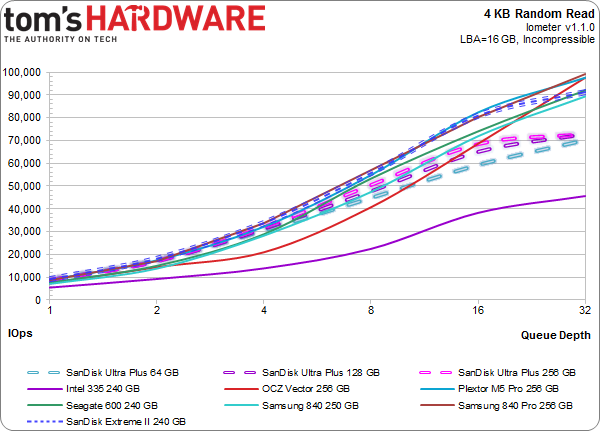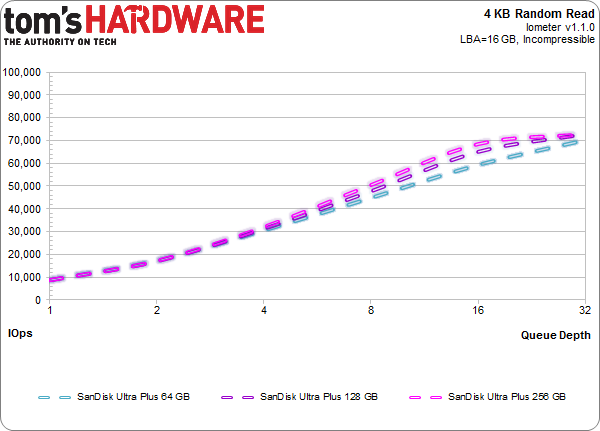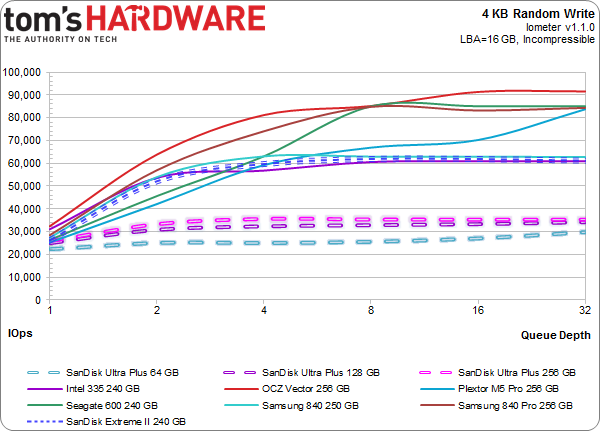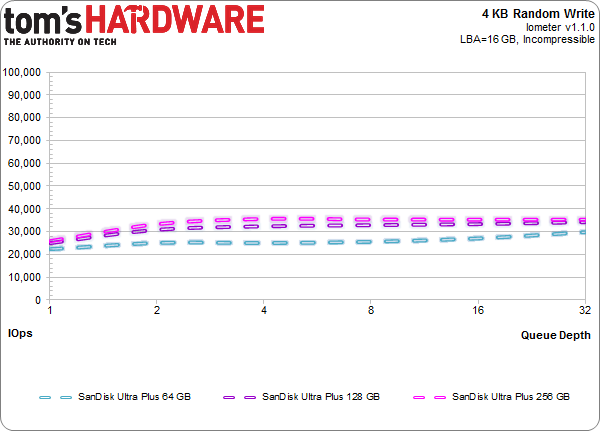SanDisk Ultra Plus SSD Reviewed At 64, 128, And 256 GB
SanDisk's Ultra Plus replaces the company's older SATA 3Gb/s SandForce-based Ultra with something a bit more modern, and with a budget-oriented price tag. We test all three capacities to see if the entry-level pricing belies a pocket rocket in disguise.
Results: 4 KB Random Performance
We turn to Iometer as our synthetic metric of choice for testing 4 KB random performance. Technically, "random" translates to a consecutive access that occurs more than one sector away. On a mechanical hard disk, this can lead to significant latencies that hammer performance. Spinning media simply handles sequential accesses much better than random ones, since the heads don't have to be physically repositioned. With SSDs, the random/sequential access distinction is much less relevant. Data are put wherever the controller wants it, so the idea that the operating system sees one piece of information next to another is mostly just an illusion.
4 KB Random Read
At queue depths lower than eight, the Ultra Plus family takes charge and collectively runs at the top of the heap. It isn't until we hit the rarefied queue depths of 16 and 32 that higher-end desktop drives break away. More than 20,000 IOPS separate the fastest Ultra Plus from the leaders with 32 outstanding commands. It's far more important that SanDisk wins at lower queue depths, particularly in a client environment, though.
SanDisk's newer Extreme II enjoys a substantial advantage over the Ultra Plus line-up. But we'd expect that to be the case, since the Extreme II's controller has twice as many memory channels and a generational advantage. All things considered though, the difference is only significant once you have more than eight outstanding commands. We'd hardly call that a severe deficiency in a typical consumer environment. If you popped one of these drives into your mom's laptop, she's not going to complain about its performance.
All three capacity points hand in remarkably similar 4 KB random read numbers. There is some separation, but it's not very significant. In all actuality, we're not particularly surprised to see the smallest and largest models so close together as we step through the queue depths. It doesn't take much flash to achieve spectacular read performance, so you'd really only expect the big differences in write tests.
4 KB Random Write
SanDisk's drives don't do as well in random write tests. Collectively, all three show up as the slowest SSDs in this test. There is slight scaling above a queue depth of one, but they're all pretty much tapped out above two outstanding commands. The mainstream and performance drives in this 4 KB random write chart completely outpace the Ultra Pluses. Samsung's TLC-based 840 cannot stand up to the MLC-based 840 Pro, but it still falls in the same ballpark as every other non-Ultra Plus drive.
Get Tom's Hardware's best news and in-depth reviews, straight to your inbox.
Random write performance is extremely important, no question about it. Early SSDs didn't do well in this metric at all, seizing up in even the most lightweight of workloads. Newer SSDs wield more than 100x the performance of drives from 2007, but there's a point of diminishing returns in client environments. When you swap a hard drive out for solid-state storage, your experience improves. Load times, boot times, and system responsiveness all get better. If you needed to, your SSD-equipped system could handle a lot more I/O than the spinning media you had in there before.
Neither the 128 nor the 256 GB Ultra Plus puts much distance on the 64 GB model. This could be a limitation of the four-channel controller. It's worth noting, however, that even the 64 GB drive is capable of twice the 4 KB random write IOPS of Intel's SSD 510. That's called progress, and we're all for it.
Current page: Results: 4 KB Random Performance
Prev Page Results: 128 KB Sequential Performance Next Page Results: Tom's Hardware Storage Bench v1.0-
kevith I have had the former SanDisk Extreme 128 GB for a year now, and it´s definitely fast enough. But what´s more impressive is, that after a year, the write amplification still hovers between 0,800 and 0,805. I´m using it in my laptop for quite "normal" use, FB, YouTube, mail, wordprocessing etc.on Windows 8 64-bit. So far it has served me very well, my next SSD is going to be another SanDiskReply -
Soda-88 I recommended this SSD (256GB) to my friend just a week ago since it was nearly as cheap as top of the line 128GB SSDs, glad to read positive review.Reply -
alidan im honestly looking into ssd drives for games and mass small file storage.Reply
these are cheap, and they are large, would definitely help with load times/game performance, and browsing images stored enmass. -
Brian Fulmer I ordered 5 Extreme 128GB drives in March (model SDSSDHP-128G). I've been using OCZ, Kingston, Samsung and Crucial drives in every desktop and notebook I've deployed since August 2013. Out of ~75 drives, I've had 1 bad Vertex 4 and 6 defective by design Crucial V4's. Of the 5 SanDisks, 2 failed before deployment. Support was laughably incompetent in demanding the drives be updated with the latest firmware. Their character mode updater couldn't see the drives, because they DIED. SanDisk is no longer on my buy list.Reply
Incidentally, of the 8 SSD model SSD P5 128GB, I've had one die. The context should be of 35 Vertex 4's, I've had one die. I've had zero failures with 15 840's despite their supposedly fragile design. -
ssdpro Brian Fulmer's comments are very reasonable (except the "deployed since Aug 2013" part lol). Way too many people experience a failure then scream all drives from that mfg are junk. I have owned 2 840 Pro drives and had one fault out. Does that mean Samsung drives have a 50 percent failure rate? For me, yes, but overall no and I am definitely not that naive. The 840 Pro can and do fail like anything electrical can. I have owned probably a dozen OCZ drives and had one Vertex 2 failure - does that mean OCZ/SandForce firmware stinks and they aren't reliable? No, it just means a drive died and who knows why. I have owned a couple SanDisk products and none failed. Does that mean SanDisk is the best? No... it just means I didn't have one die but I also only sampled 2.Reply -
Combat Wombat These and the OCZ drives from newegg are looking mighty close in price!Reply
BF4 Rebuild is about to take place :D -
@ssdpro: spot on. sure, if i buy from vendor a and his product fails, i will probably not buy from him again. if it fails more than once, there is no chance i'll buy his stuff again and i also will warn others about it. but understandable as this is, in the end even that doesn't mean much about the reliability of the manufacturer.Reply
that's also why i'm a bit sceptical about product ratings on amazon and the likes, since people are more inclined to complain about a bad experience, than share their view on a product that simply does what it should do: work.
what we would need more often are statistics from bigger companies, or even repair services, so we don't have to base our purchases on samples of a few dozen to a few hundreds, but on thousands upon thousands of cases. -
flong777 The 840 Pro still appears to be the fastest overall SSD on the planet - but the difference between the top 5 is pretty much negligible. Among the top five, reliability and cost become the determining factors.Reply -
anything4this I don't understand the ~500MBs read limit on the drives. Is it an interface bottleneck?Reply



